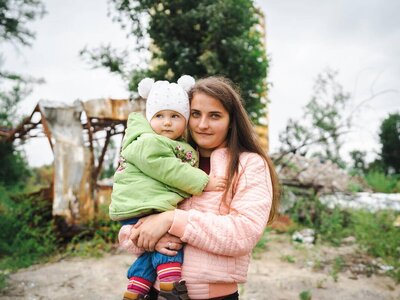Ukraine
- 5 million
- people in need of food and livelihoods assistance
- 3.6 million
- internally displaced people
- 1 million
- people reached on average every month by WFP
The war in Ukraine, now in its fourth year, continues to have devastating consequences for people inside the country while also threatening global food security.
The war in Ukraine, now in its fourth year, continues to have devastating consequences for people inside the country while also threatening global food security.
The war has caused one of the fastest forced population movements since the Second World War. A total of 5 million Ukrainians are still living as refugees in Europe, while another 3.6 million are internally displaced. More than 46,000 civilians have been injured or killed according to OHCHR.
Many of those who stayed or returned have lost their homes or live in damaged buildings. With high inflation and unemployment across the country, an estimated 5 million Ukrainians face moderate to severe food insecurity.
Around 1 in 3 Ukrainians living in frontline regions are food insecure. In frontline areas, access to food is often compromised due to daily shelling, unsafe road and closed supermarkets. Where food is accessible, many cannot afford it. Many Ukrainians are forced to make impossible choices – such as sacrificing their own meals so their children can eat or going into debt to buy food.
The World Food Programme (WFP) works with local partners to distribute food rations within 30 km of the frontline – most of which is bought locally thanks to partnerships with local food producers and bakeries. WFP also provides cash assistance where markets are functioning, or to people suddenly displaced or evacuated.
Since March 2022, WFP has injected over US$1.3 billion into Ukraine’s economy through local procurement and direct cash assistance, helping to sustain and recover economic activity and employment.
However, delivering aid has become increasingly dangerous. More than 40 attacks on WFP’s distribution sites, or assets and vehicles of its humanitarian partners, were reported in the past 12 months.
Meanwhile, continued attacks on port infrastructure threaten to disrupt global food supply chains and drive up prices – Ukraine’s food exports fed 400 million people each year before the war.
WFP continues to advocate for the protection of food supply routes and the safe passage of commercial grain shipments, ensuring Ukraine can keep its role as the region’s breadbasket.
What the World Food Programme is doing in Ukraine
-
Food assistance
-
WFP delivers food kits and ready-to-eat food rations, primarily in hard-to-reach and frontline areas where commercial supply lines are disrupted and access to food is unreliable. Food kits typically comprise wheat flour, pasta, oats, canned beans or meat, sunflower oil, sugar and salt. WFP buys approximately 82 percent of this food inside Ukraine and works with local bakeries to deliver bread. WFP also provides food commodities to institutions such as hospitals, care centres, displacement centres and orphanages, to support the provision of hot meals.
-
Cash assistance and social protection
-
WFP distributes cash assistance to people displaced or affected by the war, where banks are functioning and food is easily accessible. Cash assistance gives people the freedom to meet their essential needs as they choose, and stimulates local economies. WFP also complements social assistance payments made by the Government, and works closely with the Ministry of Social Policy to improve the accessibility, efficiency and transparency of social assistance programmes, making it easier for people to receive assistance from the State or international organizations. WFP has distributed more than US$708 million in cash assistance to over 3 million people since April 2022.
-
Agricultural mine action
-
WFP is working with FAO, the Government of Ukraine and the Fondation suisse de deminage to survey small-scale agricultural land for the presence of mines and other explosive remnants of war, clear it where necessary, and support its safe release for food production. This can help restore rural livelihoods, sustain agricultural production, and reduce the need for food assistance for thousands of families. The project is currently underway in the Kharkiv region.
-
Emergency telecommunications and logistics
-
WFP coordinates humanitarian logistics and telecommunications services in Ukraine, as the lead organisation of the Logistics Cluster and the Emergency Telecommunications Cluster. The Logistics Cluster consolidates and shares information on logistics services, facilities and access constraints, coordinates road transport, cargo delivery and storage services, and supports cargo consolidation and planning for humanitarian convoys.
-
School meals
-
WFP works with the Ministry of Education to provide school meals through direct assistance and capacity development. Schools in Ukraine are heavily impacted by the war. Destruction of school buildings, damage to telecommunications networks used for remote learning as well as displacement of children and teachers, all contributed to psychological harm and further learning disruptions. During the 2023-2024 school year, WFP supported daily meals for 90,000 children in 700 schools across Ukraine. We plan to support 180,000 students across 1,700 schools during the 2024-2025 school year.







